Do you seen the tongue of a butterfly? / Urbanus dorantes
Today my walk in the forest was very particular. This month it has been difficult to see butterflies. I think this is due to the high temperatures, so many likely migrated to a more temperate climate. That's why being able to photograph this turquoise-brown butterfly today was quite a feat, especially because I could seen its tongue.
I invite you to read on to you see what I mean.
Hoy mi paseo por el bosque fue bien particular. Este mes ha sido difícil avistar mariposas. Creo que esto se debe a las altas temperaturas por eso es probable que muchas de ellas hayan emigrado a un lugar de clima más templado. Es por esto que poder fotografiar hoy esta mariposa de tonos marrones con turquesa fue toda una proesa, en especial porque logré ver su lengua.
¿Sabían que las mariposas tienen lengua?
Te invito as eguir leyendo para que veas a qué me refiero.
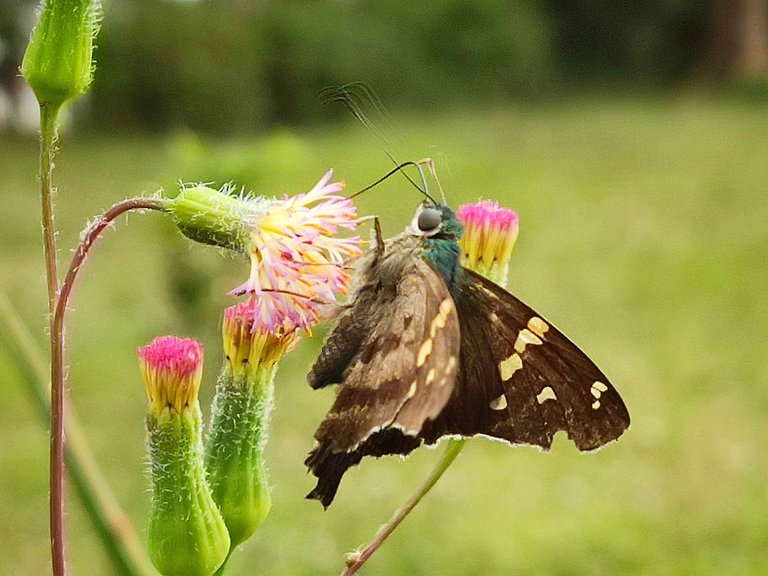
It is a butterfly of the jumping type but with a long tail. Its scientific name is Urbanus dorantes. It is common to see them flying in humid forests. They are native to the American continent (from Argentina to California, United States). It is a diurnal insect that feeds on flower nectar.
Esta es una mariposa del tipo saltarina pero de cola larga. Su nombre científico es Urbanus dorantes. Es común verlas volar en bosques húmedos de temperatura templada. Son originarias del continente americano (desde Argentina hasta California, Estados Unidos). Es insecto de hábitos diurnos que se alimenta del néctar de las flores.
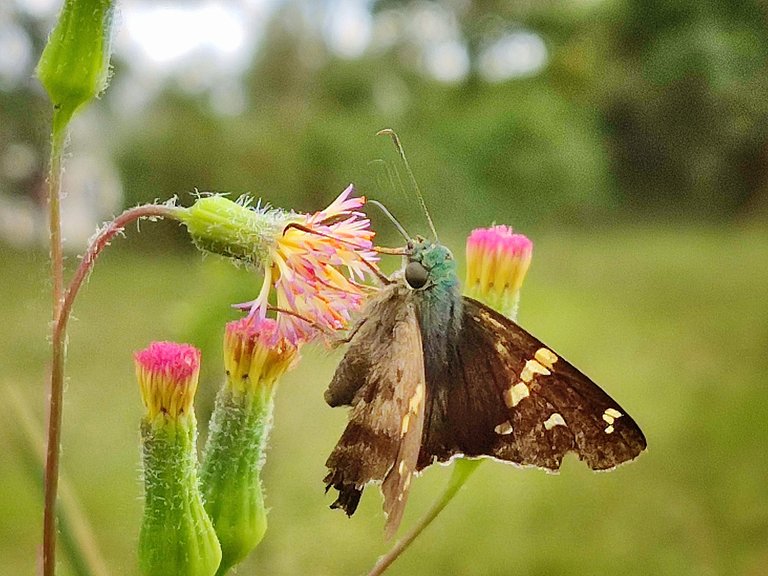
What I liked about this butterfly was that its wings have brown scales, but its body has abundant turquoise hairs. Believe me, the pic does not do justice to the beauty of this insect.
Entre las cosas que me gustaron de esta mariposa fue que sus alas tienen escamas de coloración marrón pero su cuerpo están conformado por abundantes pelos de color turquesa. Créanme que la foto no le hace justicia a la belleza de este insecto.
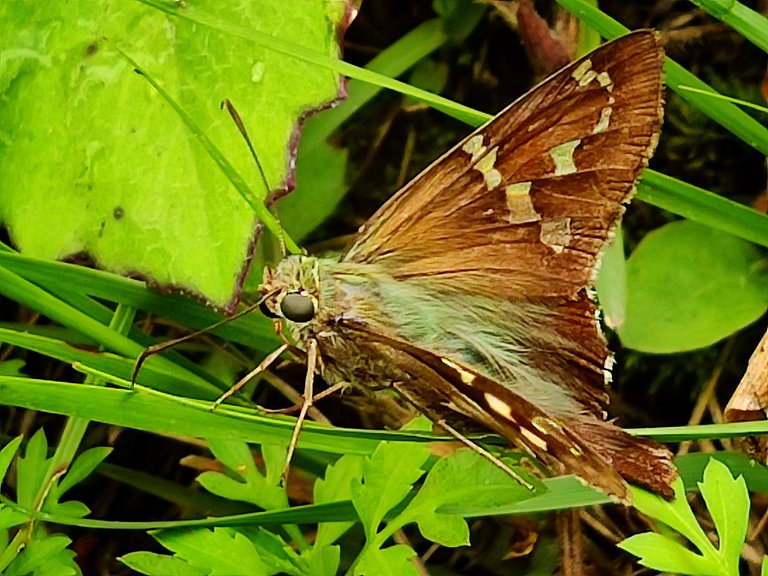
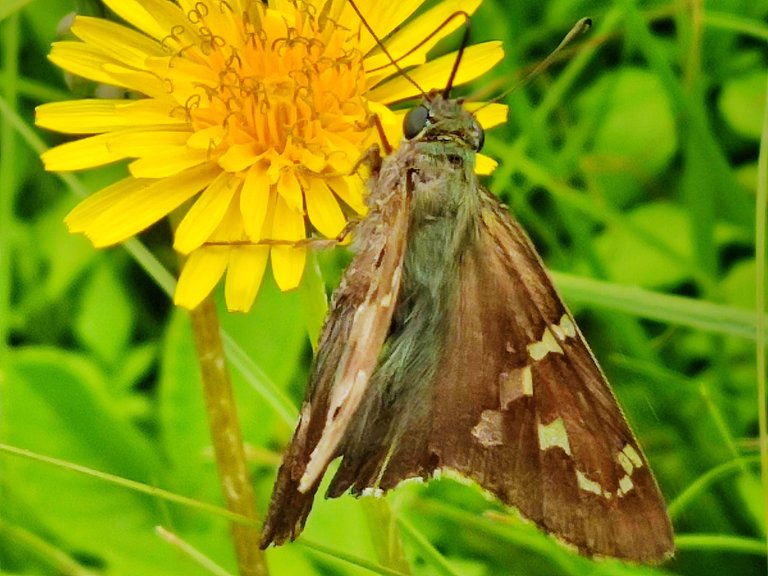
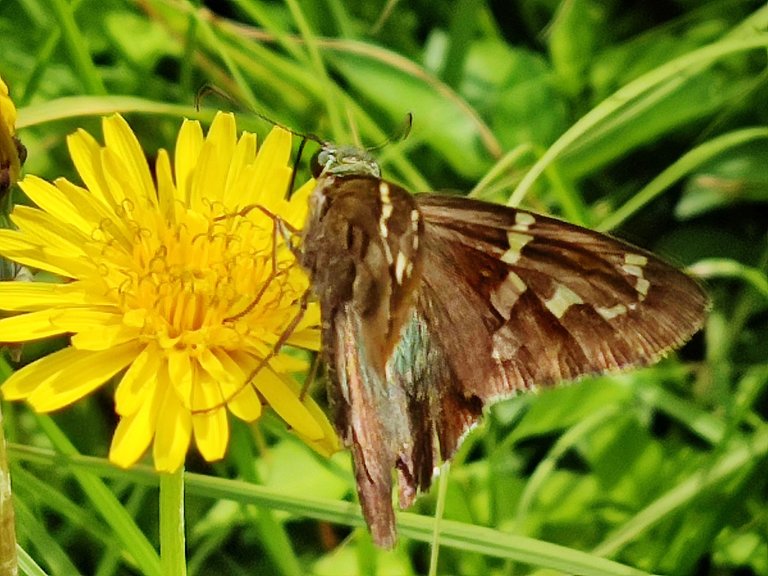
This butterfly has large eyes from the ends of which emerge long antennae that end in hooks.
Esta mariposa tiene grandes ojos de cuyos extremos salen unas largas antenas que terminan en unos ganchos.
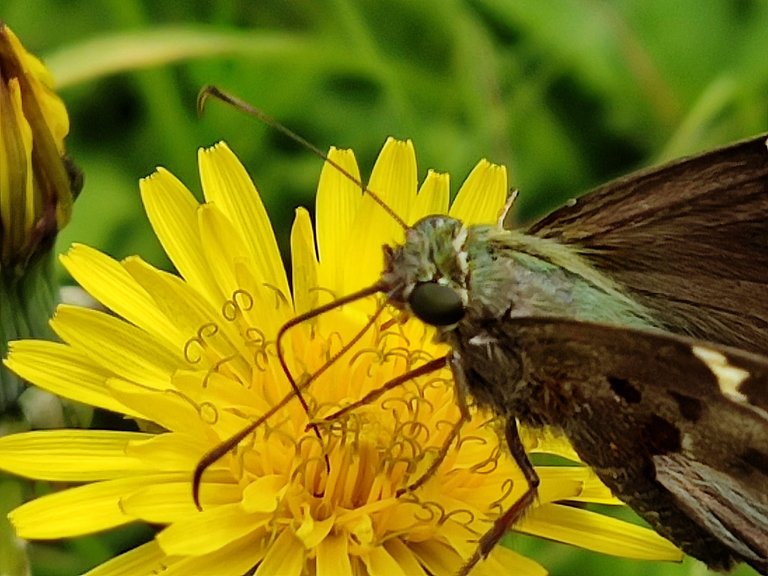
The most curious thing about this encounter with this butterfly was being able to see its tongue. Well, this structure is not a real tongue. What happens is that human beings have the habit of naming some body structures in a similar way to ours.
If you can observe in detail in the photo, the butterfly has the center of its mouth structure a black filament. This part of the butterfly is called "proboscis".
Lo más curioso de este encuentro con esta mariposa fue poder ver su lengua. Bueno en realidad no se llama lengua esta estructura. Lo que pasa es que los seres humanos tenemos la costumbre de nombrar algunas estructuras corporales de manera similar a las nuestras.
Si puedes observar con detalle la foto la mariposa tiene en el centro de su estructura bucal una especie de filamento negro. Esta parte de la mariposa se llama "espiritrompra".
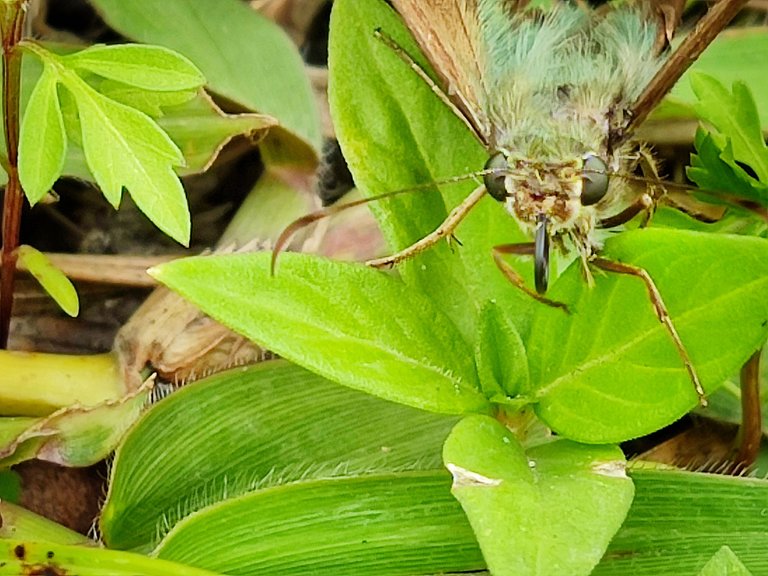
This structure is part of the butterfly's mouthparts. To feed on flower nectar and plant sap, they need to suck these nutrient-filled liquids through this long yet flexible tube.
Esta estructura es parte del aparato bucal de la mariposa. Ellas para poder alimentarse del néctar de la flores y savia de las plantas necesitan aspirar estos líquidos llenos de nutrientes a través de este tubo largo y a la vez flexible.
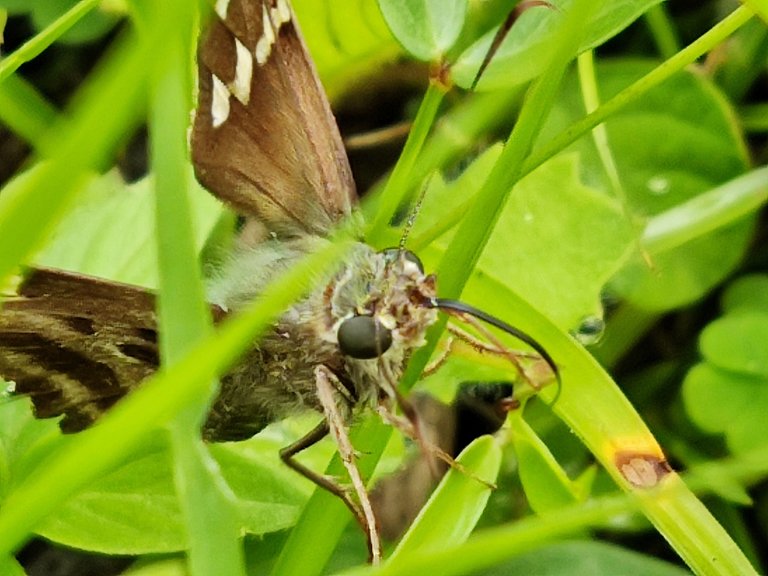
In the above pic, I could capture the precise moment when the butterfly was feeding, which was fascinating, as it rapidly extended its "proboscis" and then rolled it up on itself as if it were a whip.
En la foto anterior pude captar el momento preciso que la mariposa se estaba alimentando. ¡Esto fue fascinante! ya que extendía velozmente su "espiritrompa" y luego la enrollaba sobre sí como si se trata de un látigo.
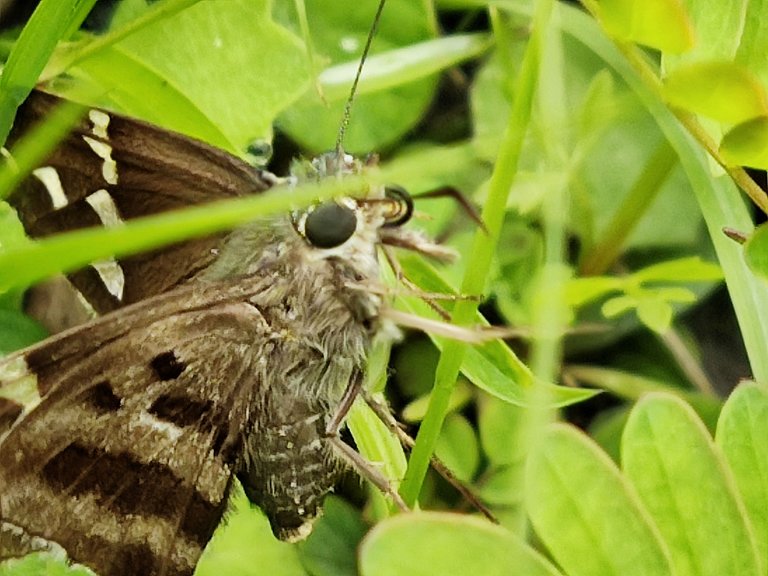
The movement of the "proboscis" is very precise. Indiana Jones would be jealous of this insect's ability to unroll and roll this structure. I read that these butterflies have a voracious appetite, sometimes becoming a pest for some crops.
El movimiento de la "espiritrompa" es muy preciso, Indiana Jones estaría celoso de la habilidad de este insecto de desenrollar y enrollar esta estructura. Por lo que he leido, estas mariposas tienen un apetito voraz a tal punto de convertirse en una plaga para algunos cultivos.
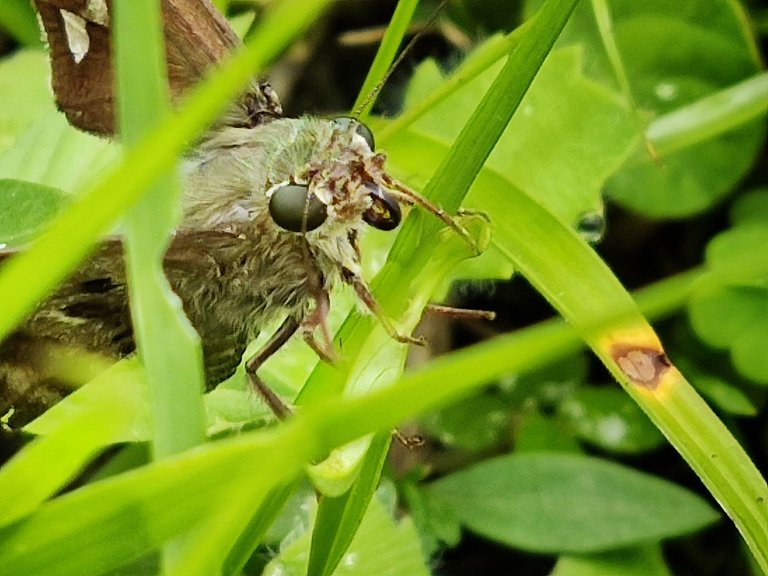
I was very grateful to have captured this moment in images. Perhaps portraying butterflies is a matter of a lot of patience, but I was able to do it.
Yo quedé muy agradecida por haber captado en imágenes este momento. Tal vez retratar mariposas es una cuestión de mucha paciencia, pero lo pude lograr.

All images are property of the author

Reference link:
DIVERSIDAD DE HESPÉRIDOS (LEPIDOPTERA: HESPERIIDAE) EN AGROECOSISTEMAS DEL ESTADO LARA, VENEZUELA
Estructura de las comunidades de lepidopteras
Los polinizadores, esos grandes desconocidos

The photos are very beautiful. I've not really seen this colour of butterflies. I mostly see yellow or red or some other colour but this one's kinda rare. Great job ma'am.
Hi @sapphirekay,
At first I thought it was a moth because of the color of its brown wings. As I got closer I saw that it was a butterfly with a beautiful turquoise color.
Thank you very much for visiting my post, I appreciate it 🦋
You're very welcome ma'am ☺
https://twitter.com/chaodietas/status/1553139480453947392
The rewards earned on this comment will go directly to the people( @chaodietas ) sharing the post on Twitter as long as they are registered with @poshtoken. Sign up at https://hiveposh.com.
Hola querida amiga @chaodietas buen dia
Que hermosas tomas, y que bello lo que has hallado, la naturaleza es sorprendente.
Aprecio que nos des a conocer toda esta informacion
que disfrutes de un hermoso dia
Muchas gracias para mi es un placer encontrar personas que también amen la naturaleza. A mí me apasiona 😄
You always give us the bibliographical sources and you didn't do it today! We invite you to place them to be able to vote for your post, hugs!
Hi @hive-127788,
Oh this was a mistake, I apologize for it. I will edit my post by placing the reference at the end to give consistency to the information.
Reference link
http://bdigital2.ula.ve:8080/xmlui/handle/654321/4184
add it to the post dear
It's done, thanks for reminder me.
I once read that there is a flower in the world that can only be pollinated by a butterfly with a giant tongue! they are exceptional animals!
We appreciate your work and your post was manually curated by @none! from the DNA team!
Reach us on Discord to learn more about the project!
Oh yes, butterflies besides being beautiful have fascinating anatomical structures. They are important for the ecological balance.
Thank you very much @dna.org @none for your support, I appreciate it.
Is that why butterfly kisses are so special? 😂
hahaha maybe, I haven't received one yet 🤣🤣🤣
😘 close enough
I am impressed by the evolutionary adaptations that the tongue has had with these insects, the way they roll it always amuses me a lot.
Hi @zainnyferdhoy,
Yes, it is impressive, it is a matter of having patience and observing carefully and enjoying these curiosities. Thank you very much for visiting my post.